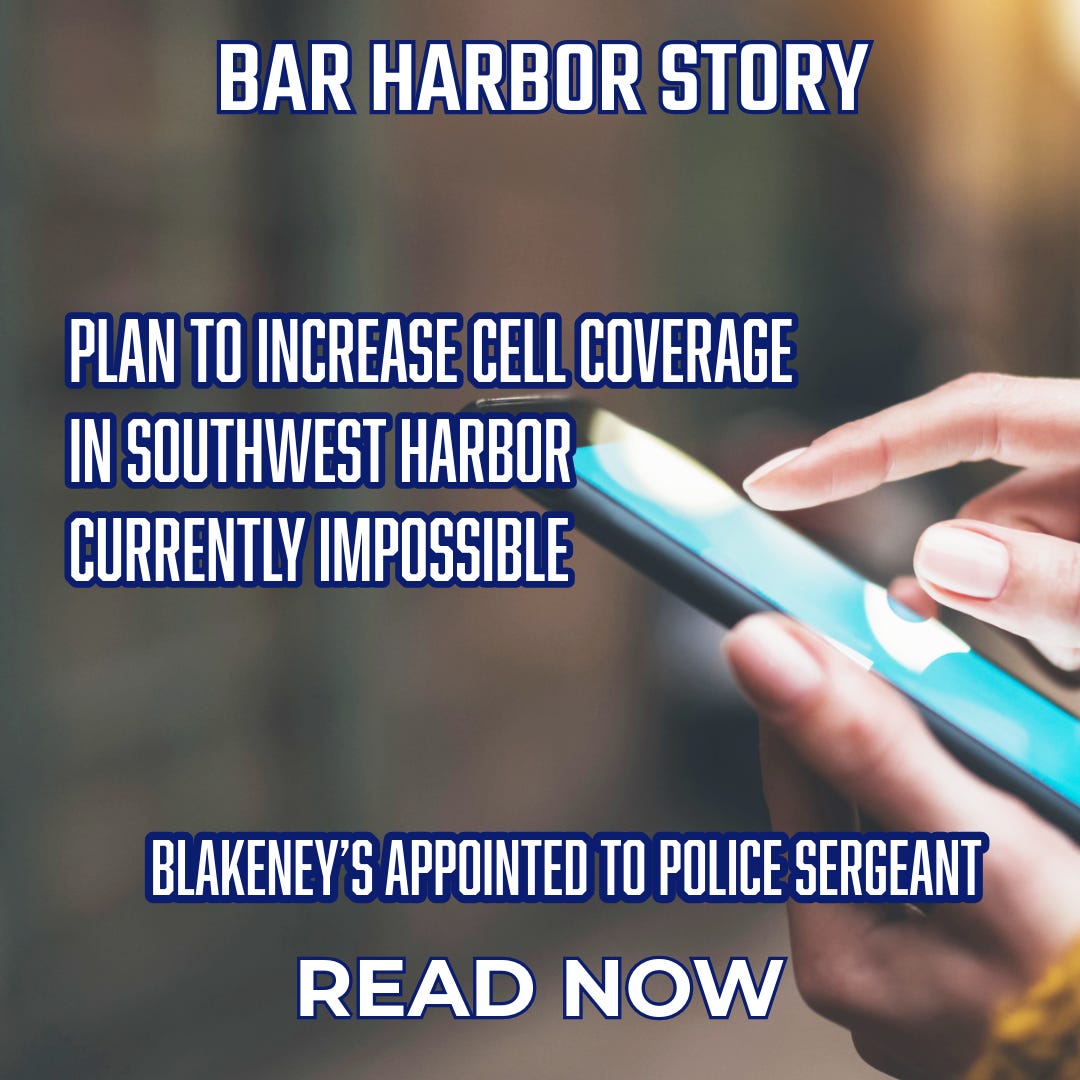Plan to Increase Cell Coverage in Southwest Harbor Currently Impossible
Blakeney appointed to police sergeant
The Bar Harbor Story is generously sponsored by Choco-Latté Café.
SOUTHWEST HARBOR—A potential master streetlight fixture agreement between the town and Ubicquia did not move forward this week because the town didn’t have the fiberoptic network to support it. The agreement would have increased cell phone coverage throughout the town at no cost to the citizens.
However, at the Southwest Harbor Selectboard meeting on Tuesday, liquor licenses for Rogue Cafe and The Harbor Restaurant Group were renewed. A special event catering permit for Fogtown Brewing Company was also discussed.
Fogtown’s owner Jon Stein was on hand to talk about the catering permit for Fogtown Brewing Company so that its staff can pour beer at the MDI Marathon Finish Line Festival. Police Chief John Hall had no issues with the application.
Jennifer LaHaye, Madilynn Michaud, and Becky Gatcomb were appointed as deputy treasurers and tax collectors. The town office will be closed on November 5 for the election. The Select Board voted unanimously to make it town policy to close the town office on voting day for every presidential election year.
The town confirmed Ryan Blakeney’s appointment as a police sergeant/constable until June 2027.
According to a memo to former Town Manager Marilyn Lowell from Tom Kroh of Ubicquia, “The street radio will provide significant improvement in cellular service for the entire community.”
THE STREETLIGHT FIXTURES
A good amount of the discussion on Tuesday centered around a master streetlight fixture attachment agreement for a 4G and 5G streetlight cellular agreement, which would have given Ubicquia the ability to attach street radio to the streetlights to improve cellular service but also monetize the town’s streetlight assets. That revenue would be $270 a year per location for a location fee and $360 a year for a streetlight attachment fee with a one-time $100 application fee per streetlight.
The town stood to make $9,000 from the 25 street radios, but the possibility was not supported by many in attendance who were concerned about the potential impact on their health.
“Do these units you’re proposing to mount on the streetlights, do they do surveillance? Do they listen? Do they have cameras attached?” Thia Embers asked the board. She also asked if the units were collecting data.
Mark Carter, RTE Energy Solutions’ vice president, spoke to the project and the lack of infrastructure to support it.
“All we’re discussing is increasing call capability,” said Carter. “This is a street radio … there’s no cameras. There’s a simple fiber connector and a backhaul.”
According to Carter, the unit is just a simple fiber connector that provides cellular capability. Fiber optic cable needs to be in the town to attach the radio transmitters to the town-owned LED lights, Select Board Chair Carolyn Ball said. The board had been unaware of that requirement when it scheduled the agenda item.
During the discussion, Laura Beal Freudig, who grew up in Southwest Harbor and now passes through on the way to her home in Bernard wrote in the Zoom chat comments, “I would like to register my hope that you do NOT vote to accept the contract to install 5G transmitters. I think it is unwise and unnecessary. The health effects are unknown. It is NOT the same thing as the microwave you’ve had in your kitchen for 40 years. 5G is a totally different beast.”
If the proposal does come up again in the future, the Select Board can have a lawyer look at it as well.
LINKS TO LEARN MORE
http://www.southwestharbormaine.org/uploads/1/1/7/4/117405999/sb_packet10.8.2024.pdf
If you’d like to donate to help support us, you can, but no pressure! Just click here.
If you’d like to sponsor the Bar Harbor Story, you can! Learn more here.





Federal law prohibits a local government from considering the supposed health impacts of wireless facilities which comply with FCC standards:
No State or local government or instrumentality thereof may regulate the placement, construction, and modification of personal wireless service facilities on the basis of the environmental effects of radio frequency emissions to the extent that such facilities comply with the regulations contained in this chapter concerning the environmental effects of such emissions.
47 U.S.C. Sec 332(c)(7)(B)(iv)
I see the tin-foil hat crowd was out in force